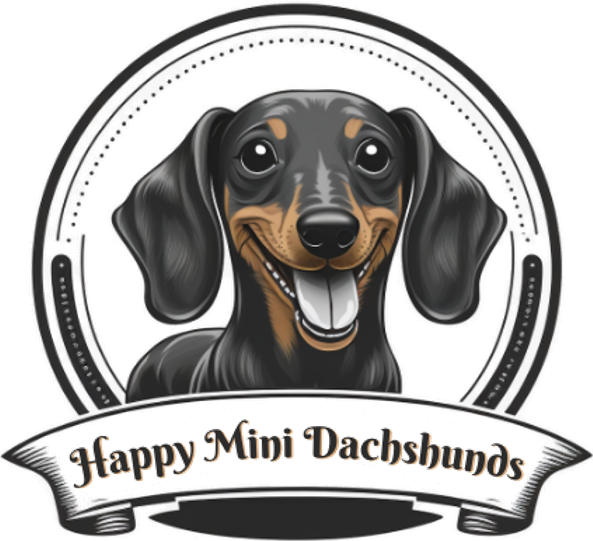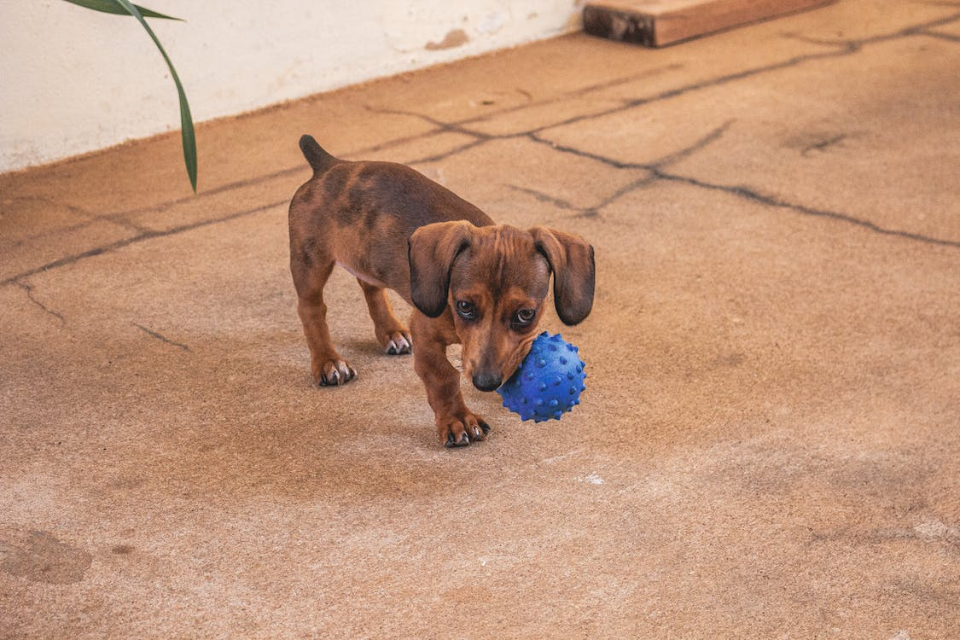Miniature Dachshunds are popular pets for many reasons. They are small, cute, and have unique personalities that are endearing to many dog lovers. However, like all dogs, they require proper discipline to ensure they behave well and follow the rules in your home.
Disciplining a mini dachshund may seem daunting, especially for new pet owners. Many pet owners may not know where to start or may not be aware of the best practices for disciplining their furry friends. In this blog post, we will discuss how to discipline a mini dachshund in-depth, providing valuable information and useful tips to help you effectively train your dog.
We will begin by discussing the behavior of mini dachshunds, including their traits and temperament, and how their behavior can be influenced by their size and history as hunting dogs. Then, we will explore positive reinforcement training, correcting negative behavior, training tools, and consistency and persistence in training.
Whether you’re a new pet owner or an experienced dog trainer, this blog post will provide valuable insights into the best ways to discipline a mini dachshund. By the end of this post, you’ll be equipped with the knowledge you need to raise a well-behaved and happy mini dachshund.
Key Takeaways:
- Positive reinforcement techniques for training Mini Dachshunds
- Correcting negative behavior with consistency and persistence
- Effective training tools for a well-behaved Mini Dachshund
Understanding mini dachshund behavior
Miniature Dachshunds, also known as “wiener dogs,” are an energetic and playful breed that can make wonderful pets. However, their unique temperament and behavior can pose challenges for their owners. Understanding their behavior is key to properly disciplining them.
Mini dachshunds are known for being intelligent, independent, and curious. They are loyal and affectionate to their owners but can be wary of strangers. Due to their history as hunting dogs, they may exhibit a strong prey drive and have a tendency to dig, bark, and chase after small animals.
While they are small in size, they are not always easy to handle. They can be stubborn and strong-willed, which can make training a challenge. However, with the right approach, they can be trained to follow basic commands and be well-behaved.
One of the most common behavior problems exhibited by mini dachshunds is separation anxiety. They can become very attached to their owners and may become anxious and destructive when left alone. They may bark excessively, dig, or chew on furniture, which can be frustrating for their owners.
Another common behavior problem is excessive barking. Mini dachshunds are known for being vocal and may bark at the slightest noise or movement. This can be problematic if you live in an apartment or have close neighbors.
To properly discipline a mini dachshund, it’s important to understand their behavior and temperament. Positive reinforcement training is often the most effective approach, as it focuses on rewarding good behavior rather than punishing bad behavior. Consistency and patience are also important, as it may take some time for your dog to learn new behaviors.
Positive reinforcement training
Positive reinforcement training is a method of training that focuses on rewarding your dog’s good behavior rather than punishing bad behavior. This method has been found to be effective and humane, and can be especially helpful when disciplining a mini dachshund.
The key to positive reinforcement training is to reward your dog for behaviors that you want to encourage. This can include giving treats, praise, or toys when your dog follows a command or behaves appropriately. It’s important to be consistent and clear with your commands, and to reward your dog immediately after they exhibit the desired behavior.
For example, if you want to train your mini dachshund to sit on command, you would start by saying “sit” and gently guiding them into a sitting position. Once they sit, immediately reward them with a treat or praise. Repeat this process several times until your dog starts to associate the command with the desired behavior.
It’s important to note that positive reinforcement training should be used in conjunction with other training techniques, such as socialization and desensitization. Socialization involves exposing your dog to different people, places, and experiences in a positive and controlled way, which can help prevent behavior problems later on. Desensitization involves gradually exposing your dog to things that may trigger anxiety or fear, such as loud noises or other animals, in a safe and controlled way.
When disciplining a mini dachshund, it’s important to avoid using physical punishment or negative reinforcement, such as hitting or yelling at your dog. These methods can be harmful and can lead to further behavior problems. Instead, focus on reinforcing positive behaviors and redirecting negative behaviors in a positive way.
Related: How to Get Mini Dachshund to Stop Biting?
Correcting negative behavior
Despite your best efforts to train your mini dachshund, there may be times when they exhibit negative behaviors. Correcting these behaviors requires patience and consistency.
- Avoid physical punishment: It is essential to avoid physical punishment when correcting negative behavior. Physical punishment can cause fear and anxiety in your dog and may even escalate the problematic behavior. Instead, focus on positive reinforcement training techniques.
- Use positive reinforcement training techniques: Positive reinforcement training techniques are the most effective way to correct negative behavior in dogs. For example, if your mini dachshund barks excessively, reward them when they stop barking. This technique reinforces good behavior and encourages your dog to repeat it in the future.
- Redirect negative behavior: Another technique for correcting negative behavior is to redirect your mini dachshund’s attention. For example, if your dog is chewing on furniture, redirect their attention to a toy or treat.
- Consistency is key: Consistency is critical when correcting negative behavior. Be consistent with your commands and rewards, and avoid reinforcing negative behavior accidentally.
- Seek professional help: If your mini dachshund’s negative behavior persists despite your efforts, seek professional help from a qualified dog trainer or behaviorist.
By using positive reinforcement training techniques, redirecting negative behavior, and being consistent, you can correct negative behavior in your mini dachshund effectively.
Training tools
While positive reinforcement and correcting negative behavior are the foundation of training a mini dachshund, using the right tools can help make the process easier and more effective.
Treats
- Treats are an essential tool for positive reinforcement training.
- Use small, soft treats that are easy for your mini dachshund to chew and swallow quickly.
- Treats should be given immediately after your dog performs the desired behavior.
- Avoid using treats that are high in fat or calories as they can lead to weight gain and health problems.
Clicker
- A clicker is a small handheld device that makes a clicking sound when pressed.
- The sound of the clicker marks the exact moment your mini dachshund performs the desired behavior.
- The clicker is often paired with treats to reinforce positive behavior.
- The clicker is also helpful in teaching your mini dachshund new tricks and behaviors.
Harness and leash
- A harness and leash are essential tools for training your mini dachshund to walk on a leash.
- A harness is a better option than a collar as it puts less pressure on your dog’s neck and spine.
- Use a short leash and keep your mini dachshund close to you to prevent them from pulling or running away.
Crate
- A crate can be a helpful tool for potty training and providing your mini dachshund with a safe space.
- Use a crate that is the right size for your dog and make it comfortable with blankets and toys.
- Never use the crate as a punishment, and always provide positive reinforcement when your mini dachshund enters or exits the crate.
Bells
- Bells can be used to train your mini dachshund to signal when they need to go outside to potty.
- Hang a set of bells on the door handle that leads outside and ring them every time you take your mini dachshund out to potty.
- Eventually, your mini dachshund will learn to ring the bells when they need to go outside.
Consistency and persistence
Training a Mini Dachshund requires patience, persistence, and consistency. Dogs learn through repetition, and if you want them to understand what you’re teaching them, you need to practice regularly. Consistency means using the same cues, rewards, and training methods. If you switch up your approach, your Mini Dachshund may become confused and fail to make the necessary connections between the command and behavior.
It’s important to be persistent as well. Don’t expect your Mini Dachshund to learn new behaviors overnight. Dogs need time to learn and practice new behaviors. Depending on the complexity of the behavior, it may take weeks or months to master. Training sessions should be short and frequent, preferably every day. Training sessions should also be fun for both you and your dog. Dogs learn best when they are having a good time.
Additionally, training should not only be focused on obedience commands but also on other aspects of your Mini Dachshund’s behavior such as socialization, leash training, and even grooming. Consistent training in all areas of your Mini Dachshund’s life will lead to a well-rounded, happy, and healthy pup.
Conclusion
In conclusion, training your mini dachshund can be a challenging yet rewarding experience. It is important to understand their behavior and to use positive reinforcement training methods to effectively teach them new behaviors and correct negative ones. Consistency and persistence are key, and utilizing appropriate training tools such as treats and clickers can aid in the training process.
Remember, training your mini dachshund is not just about obedience, but also about building a strong bond and relationship with your furry companion. By putting in the effort to properly train and socialize your mini dachshund, you can ensure that they will be well-behaved and a joy to be around.
As always, it is important to consult with a veterinarian or professional dog trainer if you have any concerns or questions about your mini dachshund’s behavior or training needs. With patience, consistency, and lots of love, your mini dachshund can become a well-trained and well-behaved member of your family.

